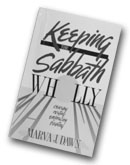Can the Sabbath fit into today's "24-7" world -- a world in which we doggedly work, study and recreate 24 hours a day, seven days a week? Numerous theologians say it can and should. Here are two important books on the subject, recommended by Tim Dearborn, dean of the chapel at Seattle Pacific University.
Readings About the Sabbath
Keeping the Sabbath Wholly by Marva Dawn
(Grand Rapids: William B. Eerdmans Publishing Company, 1989.)
In a book as practical as it is contemplative, Keeping the Sabbath Wholly by Marva Dawn shows readers the joys and advantages of Sabbath keeping. Not a legalistic duty, keeping the Sabbath -- or setting apart one in seven days as holy -- brings us into step with our natural rhythms for living. Sabbath keeping is a healthy, holistic approach to life, she writes.
 Author and adjunct professor of spiritual theology at Regent College (and
occasional guest
speaker at SPU), Dawn separates the book into four parts: ceasing, resting,
embracing and
feasting. As it unfolds, readers discover ways to cease in all areas of life
so they can truly
rest. As a result, they can embrace the Sabbath completely and feast on its
benefits.
Author and adjunct professor of spiritual theology at Regent College (and
occasional guest
speaker at SPU), Dawn separates the book into four parts: ceasing, resting,
embracing and
feasting. As it unfolds, readers discover ways to cease in all areas of life
so they can truly
rest. As a result, they can embrace the Sabbath completely and feast on its
benefits.
With a Scriptural foundation and concrete ideas to develop a wholly balanced life, Dawn reminds us that following the Sabbath brings us closer to God, showing us God's purposes anew: "Most of the days of the week we do what we have to do, what is expected of us. Sabbath keeping frees us to take delight in everything, to uncork our own spontaneity. Because there is nothing we have to do, we are free suddenly to say yes to invitations, to read fairy tales, to be children, to discover the presence of God all around us."
The Sabbath by Abraham Joshua Heschel
(New York: Farrar, Straus and Giroux, 1951.)
First published in 1951, The Sabbath by Rabbi Abraham Joshua Heschel is considered a classic book on the meaning of the Sabbath for modern man.
 Before his death in 1972, Heschel, an internationally renowned author,
scholar and theologian,
was professor of ethics and mysticism at the Jewish Theological Seminary of
America. His
book The Sabbath is a graceful look at Scripture and what he calls
God's "architecture
of time." The Bible, he writes, is more concerned with time than space. "It
pays more attention
to generations, to events, than to countries, to things; it is more
concerned with history
than with geography," he explains.
Before his death in 1972, Heschel, an internationally renowned author,
scholar and theologian,
was professor of ethics and mysticism at the Jewish Theological Seminary of
America. His
book The Sabbath is a graceful look at Scripture and what he calls
God's "architecture
of time." The Bible, he writes, is more concerned with time than space. "It
pays more attention
to generations, to events, than to countries, to things; it is more
concerned with history
than with geography," he explains.
In fluid prose and poetry, he shows that once we understand God's structure for that special time -- the Sabbath -- the importance of a sacred day is freeing. And God's command to cease makes sense, even giving time a unique "texture."
"Every seventh day a miracle comes to pass, the resurrection of the soul, of the soul of man and of the soul of all things," he writes. "A medieval sage declares: The world which was created in six days was a world without a soul. It was on the seventh day that it was given a soul."
![]()

| Please
read our
disclaimer.
Send any questions, comments or correspondence about Response to
jgilnett@spu.edu or call 206-281-2051. Copyright © 2001 University Communications, Seattle Pacific University.
Seattle Pacific University |